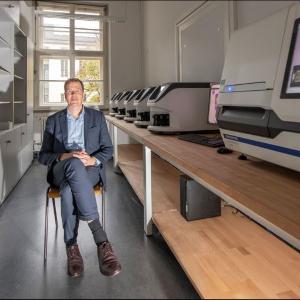Artificial intelligence improves personalized cancer treatment
30 Jan 2025
Researchers from LMU, the University of Duisburg-Essen and TU Berlin have developed a tool that can decipher complex interactions.
30 Jan 2025
Researchers from LMU, the University of Duisburg-Essen and TU Berlin have developed a tool that can decipher complex interactions.

Professor Frederick Klauschen is Director of the Institute of Pathology at LMU. | © LMU
Personalized medicine aims to tailor treatments to individual patients. Until now, this has been done using a small number of parameters to predict the course of the disease. However, these few values are often not enough to understand the complex relationships in diseases such as cancer. A research team from the Faculty of Medicine at the University of Duisburg-Essen (UDE), Ludwig-Maximilians-Universität München (LMU) and the Berlin Institute for the Foundations of Learning and Data (BIFOLD) at Technische Universität Berlin has now developed a new approach to solving this problem using artificial intelligence (AI).
Based on the smart hospital infrastructure at Essen University Hospital, the researchers brought together data from various sources - medical history, laboratory values, imaging and genetic analyses - to facilitate clinical decision-making. "Although huge amounts of clinical data are available in modern medicine, the promise of truly personalized medicine often remains unfulfilled," says Professor Jens Kleesiek from the Institute for Artificial Intelligence in Medicine (IKIM) at Essen University Hospital and the Cancer Research Center Cologne Essen (CCCE).
Interaction of 350 parameters examined
In oncological clinical practice, rigid assessment systems such as tumor staging have been used to date, which hardly take into account individual differences such as gender, nutritional status or concomitant diseases. "With the help of modern AI technologies, especially explainable artificial intelligence, or xAI for short, these complex relationships can be deciphered and cancer medicine can be significantly more personalized," says Professor Frederick Klauschen, Director of the Institute of Pathology at LMU and research group leader at BIFOLD, where this approach was developed with Professor Klaus-Robert Müller.
For the study recently published in Nature Cancer, the researchers trained the AI with data from over 15,000 patients with a total of 38 different solid tumor diseases. The interaction of 350 parameters was examined, including clinical data, laboratory values, data from imaging procedures and genetic tumor profiles. "We identified key factors that made up a large part of the neural network's decision-making processes, as well as a large number of prognostically relevant interactions between the parameters," explains Dr. Julius Keyl, Clinician Scientist at the Institute for AI in the
The AI model was then successfully tested using data from over 3,000 lung cancer patients to validate the interactions found. The AI combines the data and calculates an overall prognosis for each patient. As an explainable AI, the model makes its decision-making process comprehensible for the treating staff, as it shows how each individual parameter has contributed to this prognosis.
“Our results show the potential of artificial intelligence to look at clinical measurements not individually, but in context, to re-evaluate them and thus enable personalized, data-driven cancer therapy,” says Dr Philipp Keyl from LMU. In future, the AI method could also be used in emergencies, where it is vital to be able to assess diagnostic parameters in their overall situation as quickly as possible.
The researchers also hope to use this method to decipher complex, cross-cancer correlations that have so far remained undiscovered using conventional statistical methods. “At the National Center for Tumor Diseases (NCT) in conjunction with other oncology networks such as the Bavarian Center for Cancer Research (BZKF), we have the ideal conditions to now take the next step: to demonstrate the real patient benefit of our technology in clinical trials,” adds Professor Martin Schuler, Managing Director of the NCT West site and Head of Medical Oncology at Essen University Hospital.
J. Keyl et al: Decoding pan-cancer treatment outcomes using multimodal real-world data and explainable artificial intelligence. Nature Cancer 2025